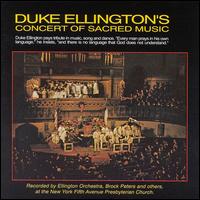Duke Ellington's Sacred Concerts
| A Concert of Sacred Music | ||||
|---|---|---|---|---|
 |
||||
| Live album by Duke Ellington | ||||
| Released | 1966 | |||
| Recorded | December 26, 1965 | |||
| Genre | Jazz | |||
| Label | RCA | |||
| Duke Ellington chronology | ||||
|
||||
| Professional ratings | |
|---|---|
| Review scores | |
| Source | Rating |
| Allmusic | |
| Second Sacred Concert | ||||
|---|---|---|---|---|
 |
||||
| Studio album by Duke Ellington | ||||
| Released | 1968 | |||
| Recorded | January 22 & February 19, 1968 | |||
| Genre | Jazz | |||
| Label | Prestige | |||
| Duke Ellington chronology | ||||
|
||||
| Professional ratings | |
|---|---|
| Review scores | |
| Source | Rating |
| Allmusic | |
| Third Sacred Concert | ||||
|---|---|---|---|---|
 |
||||
| Live album by Duke Ellington | ||||
| Released | 1975 | |||
| Recorded | 24 October 1973 | |||
| Genre | Jazz | |||
| Label | RCA | |||
| Duke Ellington chronology | ||||
|
||||
| Professional ratings | |
|---|---|
| Review scores | |
| Source | Rating |
| Allmusic | |
In the last decade of his life, Duke Ellington wrote three Sacred Concerts:
Ellington called these concerts "the most important thing I have ever done". He said many times that he was not trying to compose a "Mass" (liturgy). The critic Gary Giddins has characterized these concerts as Ellington bringing the Cotton Club revue to the church.
As early as October 1962, the Reverend John S. Yaryan approached Ellington about performing at the new Grace Cathedral in San Francisco when it opened in 1965. The cathedral planned a "Festival of Grace", with a variety of cultural works and speakers, to occur during the first year the cathedral was open, and Ellington's concert was to be a part of it. (The "festival" also included a performance by Vince Guaraldi.)
The concert premiered on September 16, 1965, and was recorded by KQED, a local public television station. The performance was released on CD as A Concert of Sacred Music Live from Grace Cathedral and on DVD as Love You Madly/A Concert of Sacred Music at Grace Cathedral. The official album on RCA, A Concert of Sacred Music, was recorded at two concerts at Fifth Avenue Presbyterian Church in New York on December 26, 1965. Additional material from these concerts, not found on the original album, can be found on the 24-CD box set The Duke Ellington Centennial Edition: The Complete RCA Victor Recordings (1927-1973). The concert mixed existing and new material, with "New World A-Commin" and "Come Sunday" from Black Brown and Beige and "Heritage (My Mother, My Father)" from the show My People. A new piece, the song "In the Beginning God", was awarded a Grammy Award in 1967. It was performed again at Grace Cathedral on its 25th and 50th anniversaries, in 1990 and 2015.
The Allmusic review by Richard S. Ginell awarded the album five stars and stated "the concert taps into Ellington's roots in showbiz and African-American culture as well as his evidently deep religious faith, throwing it all together in the spirit of universality and sealing everything with the stamps of his musical signatures".
Ebony magazine called the piece "historic", situating it as part of a larger movement in the mid-60s that brought together jazz and religion.
...
Wikipedia
